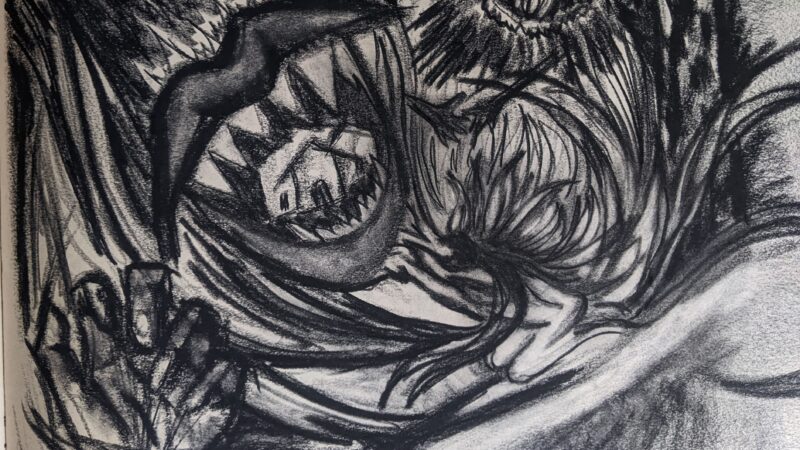It’s not very often that the word “necessary” in a book review feels, well, necessary. And yet, more than perhaps any other book to come across my desk this year, I want to shout from the mountaintops and the depths of the sea — upward, downward, and everywhere in between — that you must read this book. Journalist Prachi Gupta has penned one of the most gripping blends of memoir and reporting, writing a book whose page-turning is compelled as much by masterful macro-level storytelling as by memoir. By turns angry and achingly vulnerable, They Called Us Exceptional indicts not only the assimilation myths of the United States, but the world of mental healthcare. In this outtake — just six spare paragraphs — Gupta undoes conventional wisdom about both.
— Jina Moore Ngarambe for Guernica
Iwondered to what extent the shame our family carried over mental illness was a dead nerve transmitting the pain of the mutilated limb. The British Empire turned mental health care into a sly, devastating colonial tool used to assert white supremacy in its colonies. In India, the British established “lunatic asylums,” where they rounded up South Asians they deemed to be in violation of Victorian social norms, and as their power expanded, they turned these psychiatric hospitals into for-profit labor camps. Therapy was not about helping an individual gain a sense of peace or happiness but about harnessing their productivity and bludgeoning them into a numb, compliant subject. The specific horrors and brutal psychic violence have largely been forgotten or overlooked, but the repercussions of it remain in our minds and bodies.
Later, the system that funneled Mummy and Papa in as immigrants reduced all of us to parts, wanting our productivity but not our personhood. It used our bodies to house the lie: every day, we feel the weight of this country’s decades-long history of exclusion against us, yet simultaneously, we are the face of America’s melting pot, used to erase that very memory of our exclusion from America’s collective consciousness.
I had always felt defensive when talking about our family’s problems because I was aware that we came across as a caricature of what white people expected Indian American people to be like. It never occurred to me, until now, that maybe we fit the image so well because we had engineered our lives to match the expectations that people had of us. I wondered if the cartoonish image of an Indo-Canadian desi patriarch — an engineer turned doctor who sought a bride from India and raised his kids to achieve academically above all else — functioned as a step-by-step instruction manual to build self-worth, and we maintained that image above all else to gain some stability in the world. But I was caught in the dissonance of this liminal space, a recursive loop in which my sense of self ping-ponged between the identity the world constructed for us and the one we had constructed to keep pace with the world, keeping me small and out of touch with myself. And it was only because I had failed to conform so spectacularly to the expectations laid before me that I went searching for another plausible explanation for our family’s unraveling.
I had once thought of mental illness as a faulty switch, or a loose screw, or a jammed knob — machinery that had stopped functioning properly and must be reset to factory settings. With clinical diagnoses came a list of symptoms and drugs to stabilize, medicate, numb. I had found this view oddly comforting. Diagnosis and treatment conveyed a certainty and a sense of progression that fed into the myth that I had the power to control everything around me.
But after witnessing how a psychiatrist failed to accurately determine the cause of Mummy’s suffering, I had come to understand that these labels could not offer the certainty that I craved. A diagnosis cannot explain why someone’s pain exists, or even guarantee that it can be healed. I swung to the opposite direction, becoming deeply skeptical of psychiatric institutions, for how they defined normative behavior by whatever white Westerners found appropriate. Without acknowledgment that the system we operated in was not meant to support us, a system that would make any person of color at least a little paranoid or angry, a label felt like a way to blame someone for the failing of an entire system.
A diagnosis became a paradox: appropriate treatment could manage and mitigate the effects of an illness, but the stigma associated with its labeling was a deterrent from embracing that support. Confronting the stigma of diagnosis felt like self-annihilation. Eventually, one thing became clear to me: who felt safe enough to seek help was, to a substantial degree, defined by the rest of the world — a culture collectively sustained because of deeply ingrained attitudes about how to succeed and belong in the world. There was a significant gap between those who could even begin to think about embracing a stigmatized or controversial psychiatric diagnosis and those for whom denial felt safer or more comfortable because they lived in a world where their identity was, in very real ways, more threatened or less well-defined. It felt like a sick joke: the very rules that showed us how to belong in America were the exact same rules that now stood in the way of us receiving help.
Prachi Gupta’s debut memoir, They Called Us Exceptional, will be released on August 22 by Crown.

